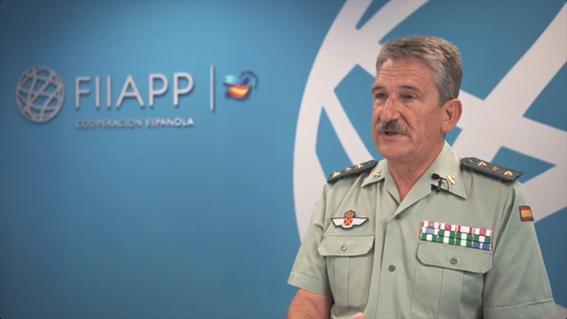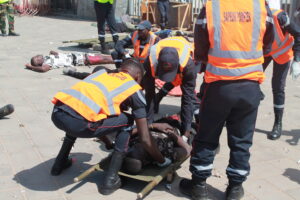-
16 February 2024
Category : Inf first person
CT PUBLIC SPACES: a successful project in the fight against terrorism
Javier Hernández, dedicates a few words at the end of the project to the work carried out and the people involved
 Javier Hernández
Javier HernándezThe first phase of the CT-PUBLIC SPACES project came to an end on 5 January, as we remain confident that cooperation in counter-terrorism with other countries can be continued in a second phase in the near future.
Promoting security, sustainable growth, social and human development in partner countries is a high priority for the European Union (EU). In this regard, it works with them to promote peace, stability and economic prosperity. The nexus between security and development is of great importance. The EU has a strategic commitment to combat terrorism globally, respecting human rights with the aim of making our societies safer.
As is already known, the project originated from the European Commission’s interest, initially through the Directorate-General for Development and Cooperation (DEVCO) and later with the Foreign Policy Instruments Service (FPI), in sharing with other countries the experiences acquired in Europe in the protection of public spaces, with large numbers of people, against terrorist threats.
In 2015, following the series of attacks suffered in Europe and other parts of the world, the European Commission designed an Action Plan which, among other things, involved the creation of a forum for the exchange of experiences in the protection of public spaces, the aforementioned forum is the HIGH RISK SECURITY NETWORK (EU-HRSN). The Spanish Civil Guard belongs to this forum, through the Rapid Action Group (RAG), which was commissioned to lead a project called “CT-PUBLIC SPACES”, financed by the European Union, to transfer and share with other countries the experiences acquired, as well as new developments in tactics, techniques and procedures in the fight against terrorism. Ghana, Kenya and Senegal were the countries initially offered to participate.
The project’s objective is to prevent terrorist attacks and, if necessary, to reduce their effects in public spaces with a large number of people. The International and Ibero-American Foundation for Public Administration and Policies (FIIAPP), as the legal contracting entity, and the support of the EU-HRSN have been involved in its implementation.

Mock attack training in Kenya After four years of exciting and intense work, a set of activities covering many of the aspects related to the protection of public spaces against terrorist threats have been carried out and have allowed:
- Raising awareness of all political and police decision-makers.
- Improving the application of capabilities in: Command and Control, Risk Analysis, as well as in the use of: tactics, techniques and procedures to PREVENT, PROTECT, REACT and RECOVER in the event of a terrorist attack.
- Encourage cooperation between law enforcement and private security. We live in an increasingly interconnected and uncertain world, so we must make more effort and update ourselves as much as possible to continue working for the benefit of our society.
I am sure that the collaboration and cooperation between all will continue; the contacts established, at different levels, between the Counter-Terrorism Fusion or Coordination Centres of Ghana, Kenya, Senegal, Member States and Delegations of the European Union, the participation of police forces as observers in the EU-HRSN, the personal and professional relations between the experts of the European Union and those of the partner countries, as well as the possible second phase of the Project, will allow us to achieve this continuity and sustainability.
In closing, I would like to express my most sincere thanks to all those who, in the exercise of their responsibilities and with their personal commitment, have made it possible to carry out this task. The list of people would be long and I do not want to leave anyone without this public recognition, so I will refer to the organisations and institutions:
- European Commission, through the Directorate-General for Development and Cooperation and the Foreign Policy Instruments Service.
- Fundación Internacional y para Iberoamérica de Administración y Políticas Públicas –FIIAPP (International and Ibero-American Foundation for Public Administration and Policies).
- EU-High Risk Security Network; EU-HRSN.
- Counterterrorism Coordination Centres: Counter Terrorism Fusion Center of Ghana National Counter Terrorism Center of Kenya Cadre Interministériel de Coordination des Opérations de lutte anti-terroriste (CICO-LAT) of Senegal.
- Centro de Inteligencia contra el Terrorismo y el Crimen Organizado of Spain (CITCO).
- Police forces: Ghana Police Service Kenya National Police Service Police Nationale et Gendarmerie du Sénégal.
- International programmes: UNOCT, SENSEC, NORPREVESEC, GARSI-Sahel…
- And of course the Spanish Guardia Civil, who, mainly with the Rural Action Unit and the Information Headquarters, have led the implementation of the project. Finally, I would like to thank the effort, interest, dedication and work carried out by the entire team that I have the honour of leading, which leaves us with the intimate satisfaction of a job well done.
Javier Hernández
Colonel of the Guardia Civil and director of the CT Public Spaces project.
The views and opinions expressed in this blog are the sole responsibility of the person who write them.






